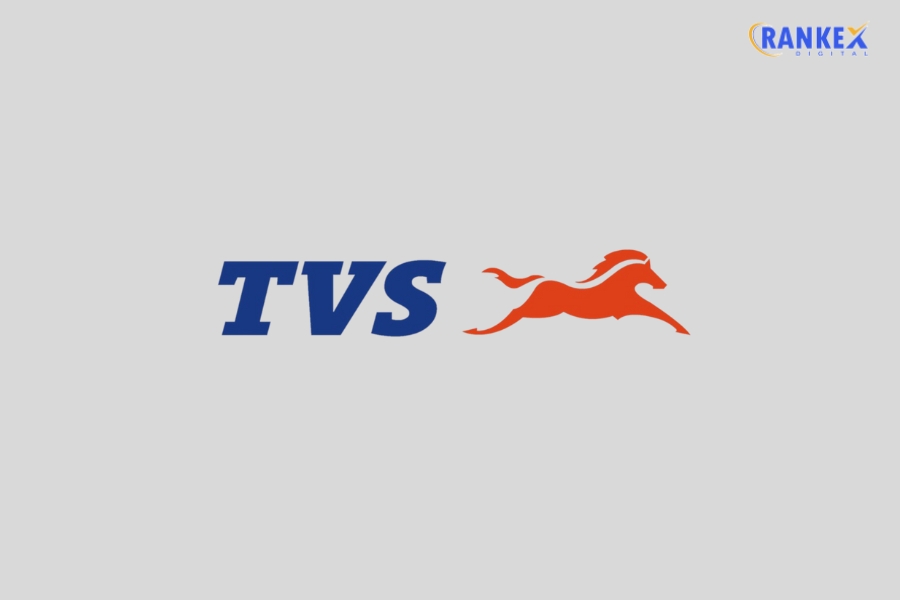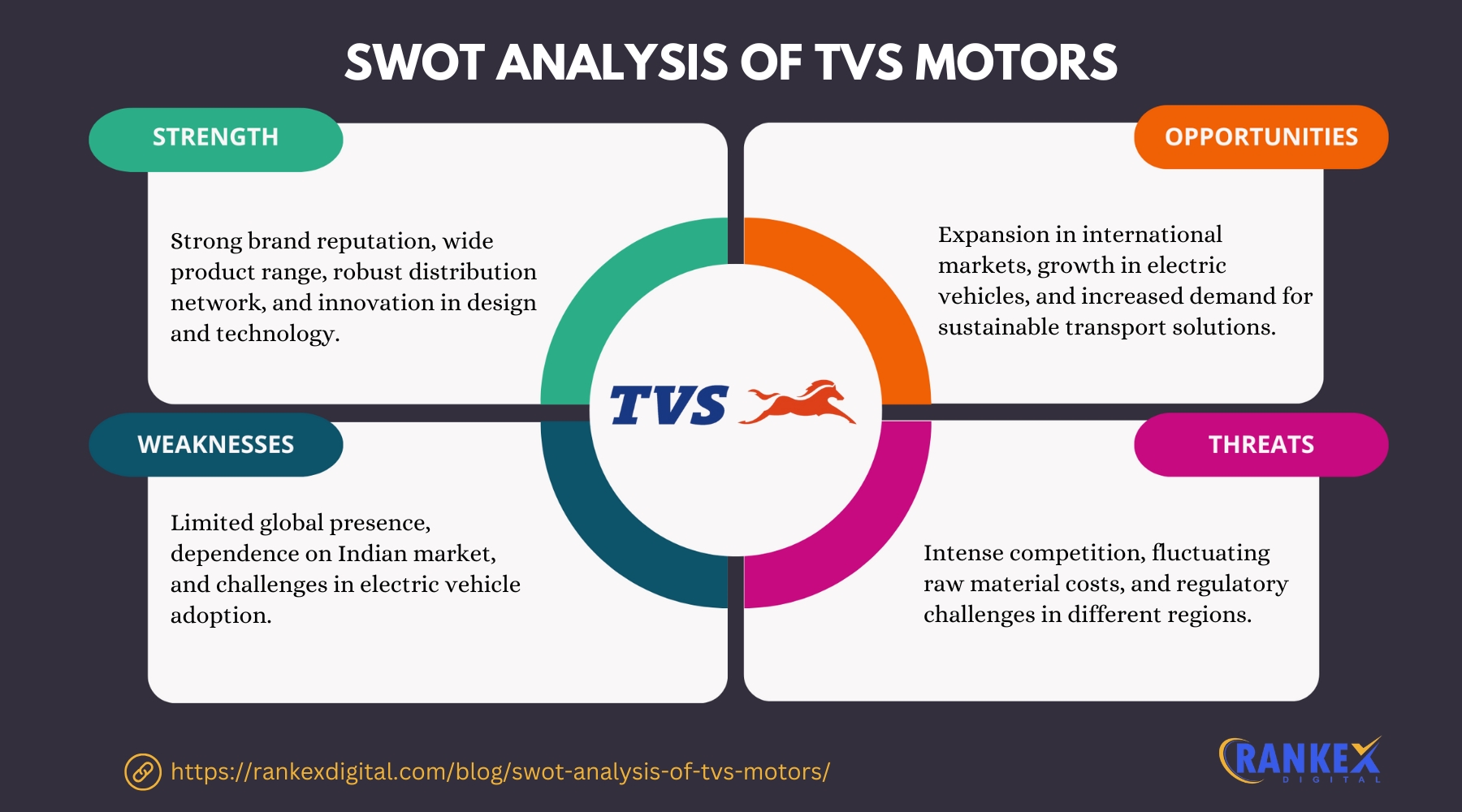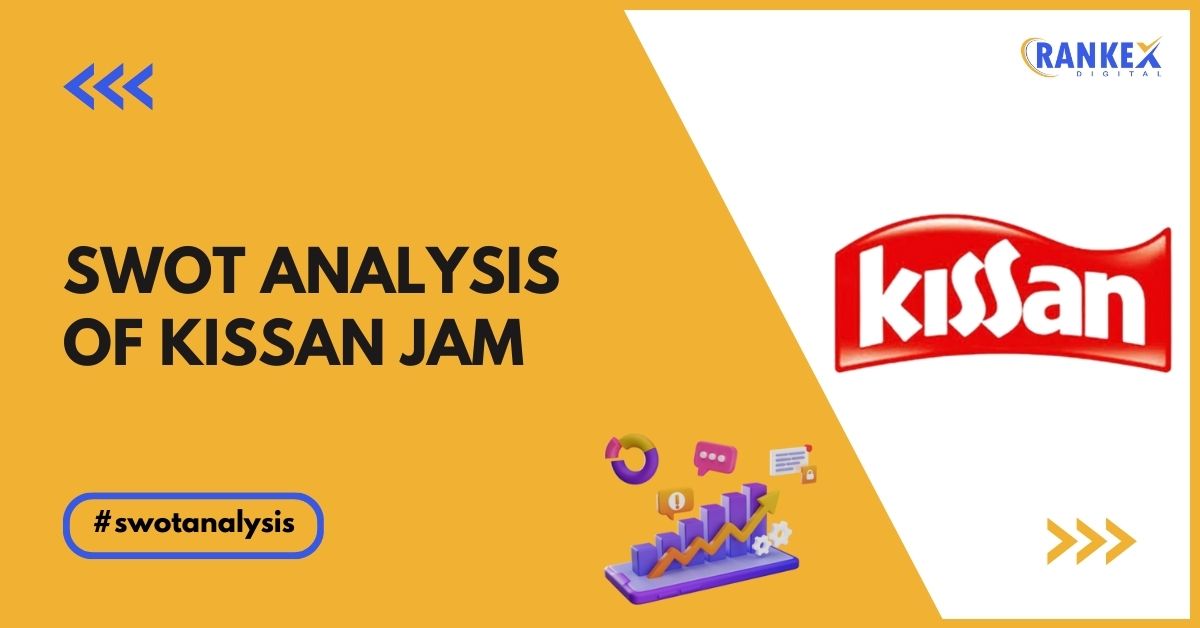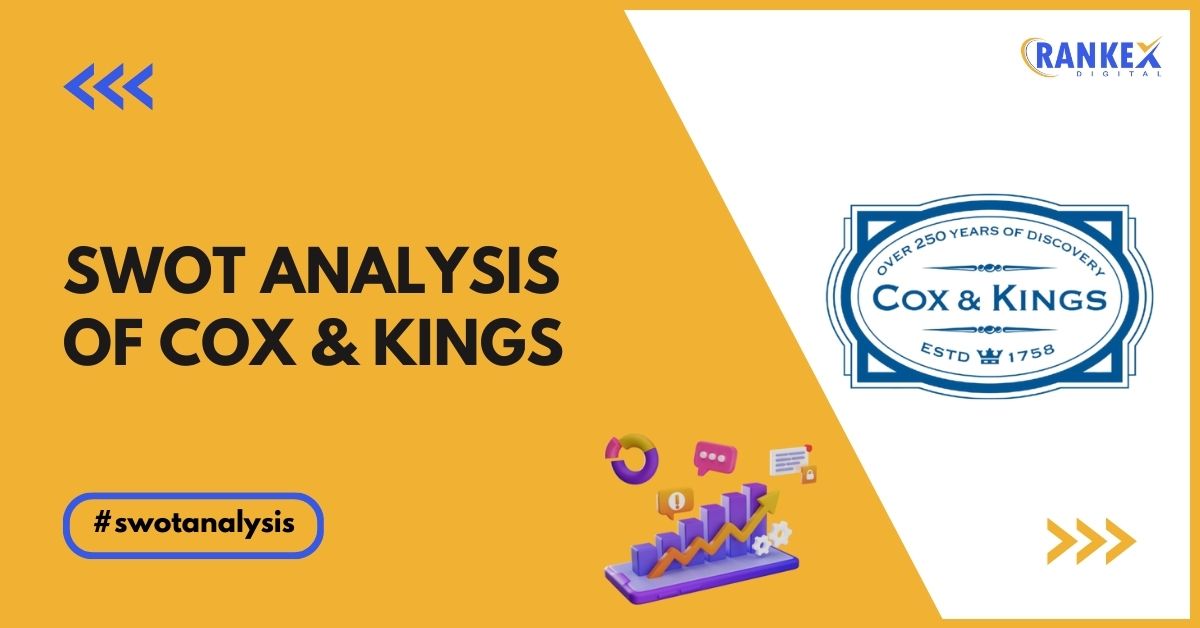TVS Motor Company is one of India’s leading manufacturers of two-wheelers and three-wheelers, known for its high-quality products and innovation in the automotive sector.
The company is a prominent player in the global automobile market, producing motorcycles, scooters, and electric vehicles. With a legacy of over 100 years, TVS has consistently evolved to meet changing customer demands and maintain its market position.
This article provides an in-depth SWOT analysis of TVS Motors, analyzing its strengths, weaknesses, opportunities, and threats in the current automotive landscape.
Table of Contents
Overview of TVS Motors

Founded in 1978, TVS Motor Company is part of the TVS Group, a well-established Indian conglomerate. Headquartered in Hosur, Tamil Nadu, TVS Motors has gained significant recognition both in India and globally, particularly for its motorcycle brands like Apache, Jupiter, and Star City. The company is also making strides in the electric vehicle market with its TVS iQube electric scooter.
TVS Motors operates across several international markets, including Sri Lanka, Indonesia, and parts of Africa, offering a diverse range of vehicles that cater to different segments of customers.
Quick Stats About TVS Motors
| Attribute | Details |
|---|---|
| Founder | TVS Group |
| Year Founded | 1978 |
| Origin | Hosur, Tamil Nadu, India |
| No. of Employees | 10,000+ |
| CEO | Sudarshan Venu |
| Company Type | Private (Publicly listed) |
| Market Cap | $8.4 Billion |
| Annual Revenue | $3.6 Billion |
| Net Profit | $270 Million |
Current News of TVS Motors
- Electric Vehicle Expansion: TVS Motors has been rapidly expanding its electric vehicle portfolio, focusing on sustainable mobility solutions.
- Global Expansion: TVS is strengthening its international presence, with increasing sales in markets like Latin America and Southeast Asia.
- Technology Integration: TVS is integrating advanced technologies into its vehicles, including connectivity features and improved fuel efficiency.
SWOT Analysis of TVS Motors

Strengths of TVS Motors
- Strong Brand Recognition: TVS Motors has established a well-respected brand in the Indian and international markets. Its reputation for reliability, performance, and quality products like the Apache series contributes to its competitive edge.
- Diverse Product Range: TVS offers a wide range of motorcycles, scooters, and electric vehicles. This diversity allows the company to target various customer segments, including young riders, professionals, and electric vehicle enthusiasts.
- Global Presence: TVS Motors has a strong export presence in over 60 countries, making it one of the leading Indian two-wheeler exporters. This international footprint helps the company diversify its revenue sources and reduce dependency on the domestic market.
- Innovative R&D: TVS invests heavily in research and development to innovate and improve its product offerings. This is evident in its growing electric vehicle segment and the incorporation of cutting-edge features in its bikes, like connected tech and advanced safety features.
- Strong Financial Performance: TVS has consistently posted strong financial results, with a solid market capitalization and increasing revenue year on year, which enhances investor confidence.
Weaknesses of TVS Motors
- Dependence on the Indian Market: While TVS has a presence in several countries, it still heavily relies on the Indian market for a significant portion of its revenue, making it vulnerable to local economic downturns or regulatory changes.
- Limited High-End Motorcycle Offerings: TVS primarily focuses on budget-friendly motorcycles and scooters, which limits its market share in the premium motorcycle segment, dominated by brands like Royal Enfield and Bajaj.
- Supply Chain Issues: The company occasionally faces supply chain disruptions, particularly with sourcing components for its vehicles. This can result in production delays and affect overall sales performance.
- Limited Electric Vehicle Options: While TVS is working to expand its electric vehicle portfolio, it is still in the early stages compared to competitors like Bajaj Auto and Hero MotoCorp, which have already launched several EV models.
Opportunities for TVS Motors
- Growth of Electric Vehicles (EVs): The global shift toward electric mobility presents a major opportunity for TVS to strengthen its EV offerings, especially with the rising demand for eco-friendly transportation solutions in India and abroad.
- Expansion in International Markets: TVS can increase its presence in untapped international markets, especially in Africa, Europe, and Latin America, where demand for two-wheelers is growing due to urbanization and affordability.
- Technological Advancements: Incorporating new technologies such as AI, IoT, and autonomous systems can help TVS differentiate itself in the competitive market and offer connected and smarter vehicles.
- Focus on Sustainable Mobility: TVS can capitalize on the increasing focus on sustainability by introducing more fuel-efficient models and increasing the adoption of electric vehicles.
- Strategic Partnerships: Collaborating with tech companies or other automakers could help TVS expand its product range and improve innovation in areas like battery technology, autonomous features, and electric mobility.
Threats to TVS Motors
- Intense Competition: The two-wheeler market in India and globally is highly competitive, with players like Honda, Hero MotoCorp, Bajaj, and Yamaha posing constant threats to TVS’s market share.
- Rising Raw Material Costs: Fluctuating costs of raw materials, such as steel, aluminium, and lithium for electric vehicle batteries, can impact production costs and profit margins for TVS.
- Regulatory Challenges: The automotive industry is highly regulated, and frequent changes in government policies, including those related to emissions and safety standards, could create compliance challenges for TVS.
- Economic Downturns: Economic recessions or slowdowns could lead to reduced consumer spending, particularly in the two-wheeler market, which is sensitive to changes in disposable income and financing conditions.
- Cybersecurity Risks: As TVS integrates more technology into its vehicles, the risk of cyberattacks and data breaches increases, which could harm its reputation and customer trust.
Conclusion
TVS Motors continues to be a leading player in the global two-wheeler market, with a reputation for innovation, quality, and customer satisfaction. While the company enjoys strengths such as a strong brand, diverse product offerings, and global expansion, it must navigate challenges such as intense competition and supply chain disruptions.
By leveraging its strengths and focusing on opportunities in the electric vehicle market and international expansion, TVS Motors can continue to maintain its competitive position in the industry.
Frequently Asked Questions
What is TVS Motors known for?
TVS Motors is known for manufacturing a wide range of two-wheelers, including motorcycles and scooters. The company is also expanding into the electric vehicle segment with models like the TVS iQube.
What are the strengths of TVS Motors?
TVS Motors’ strengths include a strong brand reputation, diverse product range, global presence, innovative R&D, and strong financial performance.
What are the main weaknesses of TVS Motors?
The company’s weaknesses include heavy dependence on the Indian market, limited high-end motorcycle offerings, occasional supply chain issues, and limited electric vehicle options compared to competitors.
How is TVS Motors capitalizing on electric vehicles?
TVS Motors is expanding its electric vehicle offerings, such as the TVS iQube electric scooter, and plans to introduce more eco-friendly models to meet the growing demand for sustainable transportation.
Who are the competitors of TVS Motors?
TVS Motors faces competition from other two-wheeler manufacturers such as Hero MotoCorp, Bajaj Auto, Honda, Yamaha, and Royal Enfield, particularly in the domestic and international markets.











